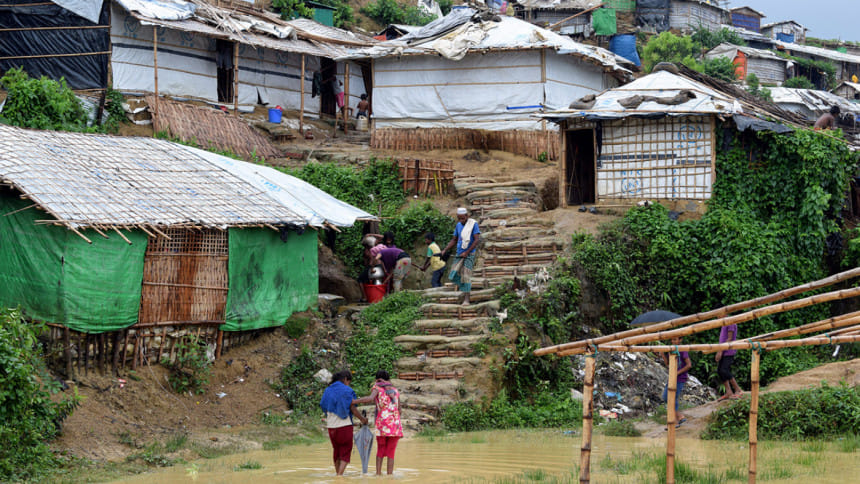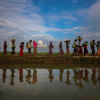Unexplained murders raise fear in camps

As darkness descends, a sense of unshakeable foreboding grips Rohingya refugee camps in Balukhali and Kutupalong.
Stories of murders, along with other crimes, are rife. Rohingyas refuse to speak on the matter, fearing for their lives.
According to Cox's Bazar police, a total of 19 Rohingyas, including two community leaders, were murdered in the last six months. Fifty-five Rohingyas have been arrested in connection with all the murders. Yet the police are still to find any answers.
The first of the murders was of a community leader back in January.
Another murder of yet another community leader still fresh in the minds of the Rohingyas happened less than a month ago.
On the evening of June 18, 40-year-old Arifullah, a well-educated Rohingya community leader, was murdered by a group of knife-wielding men, in the middle of a busy pathway in Balukhali refugee camp in Cox's Bazar.
He was stabbed 25 times and he breathed his last, lying in a pool of his blood.
Arifullah's death preceded the chill that currently grips the camps. The spate of murders has left the Rohingyas insecure in their own refuge.
“As violence seems to be on the rise over internal feuds among the Rohingya, we are sending two platoons of police soon,” Home Minister Asaduzzaman Khan told The Daily Star on Friday, adding the government will do everything to maintain law and order in the camps.
Bangladesh authorities have planned to deploy around 2,000 policemen to guard the refugees. This will be in addition to the 700 policemen currently working in the camps.
A resident of Balukhali, asking not to be named, said, “The scenario totally changes when night falls. As everyone else leaves, we are left alone and then things happen.”
Police officials said the internal conflicts between Rohingyas stem from establishing supremacy and previous enmity. The enmity is said to have developed back in Myanmar.
Others claim that being provided their necessities and having nothing to do are reasons behind the rise in crime. Many also point to the believe that the ghettoisation of the camps.
A total of 231 cases were filed against the Rohingya people and 451 were arrested.
The other crimes committed in the camps include rape, abduction, smuggling, drug peddling, and attempted robbery.
Arifullah's death though still remains hard to explain.
The 40-year old, called Majhi, or community leader, was liked by all in the community. He liaised with Bangladeshi officials and represented the Rohingya to the visiting foreign dignitaries. He also worked for international agencies in Myanmar.
He was attacked once before back in January 19, but he was lucky at the time.
So far, police have arrested three suspected Rohingya men over the killing, but are yet to ascertain the motive.
“The investigation into the killings is on. We suspect internal conflicts over supremacy led to the killings,” said Cox's Bazar Superintendent of Police AKM Iqbal Hossain.
“Rohingyas have locked into clashes over silly matters most of the time,” Afrujul Haque Tutul, assistant superintendent of Cox's Bazar Police, told The Daily Star.
Tutul said five police camps were set up in various points inside the Rohingya camp four months ago to maintain law and order.
“It is nearly impossible to maintain a million people by such a small force,” he said, adding that they have already requested for two armed police battalions for the Rohingya camps.
During his recent visit to the Rohingya camps, Peter Maurer, president of the International Committee of the Red Cross, said, “What I hear from my colleagues is obviously a big concern. It is obvious that it is a big challenge when you have big numbers [of people], poor conditions and cramped situations.”
More than 700,000 Rohingyas, escaping the Myanmar Army crackdown that began in August 25 last year, have been given shelter in squalid, cramped camps in Cox's Bazar.

 For all latest news, follow The Daily Star's Google News channel.
For all latest news, follow The Daily Star's Google News channel. 







Comments